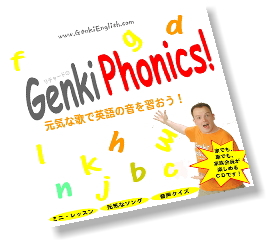
Just a quick word to let you know that the Genki Phonics CD has now sold out – forever!
The phonics CD pretty much instantly became a big hit. Non English speaking teachers were saying how much fun it was in class and parents were loving it.
But over the years as I learnt and researched more about phonics I realised that starting with just the sounds in this way just wasn’t working as well as it should. Many teachers had problems pronouncing the individual sounds and the kids weren’t progressing as fast as I would like.
So I took the hard choice to discontinue the CD.
There is still the phonics review song in the Download Pack (on vol. 7) and I may come back to songs for phonics later.
But the Phonics CD has been fully replaced by the new Phonics Posters based system. Even with the “5 Minute Phonics” version the results are so much better than just learning the sounds on their own. In fact they are astronomically better and are my top recommend programme for reading!
Now I could be tempted to just knock out a ton of phonics CDs because I knew they would sell well (and I also know that the poster based lessons are a much tougher sell!) but I’m not really into the McDonalds “Sell what people want even if it’s bad for them” style of things.
I hope you understand!
Be genki,
Richard
P.S. I’ve also just started a weekly blog in Japanese, covering a lot of the key points that teachers asked about as well as some of the popular past posts from this blog. Here’s this weeks, https://genkienglish.net/eigo/ which is based on the English version here: How to Massively Increase Your Students’ English – The Secret Warm Ups



Dear Richard!
Thank you for showing an example how to go FORWARD in life!
Be always so genki as you ARE!
Richard, you are right; even most native English speakers cannot pronounce some of the phonemes in English in isolation. People tend to say buh instead of b for instance, when they try to pronounce b in isolation. If you ever decide to do another phonics CD, I suggest that you arrange the sounds of English in the same way that the Japanese alphabet is arranged. First, all of the vowel sounds (not the 5 vowels, but the 15 or so vowel sounds), then the first consonant sound pronounced along with each of the vowel sounds (ba bay be bee bi by bo bow bu bue boy baw bow ber and boo as in book), then each of the approximately 24 other consonant sounds done in the same way. You could also include the consonant sounds that are pronounced as pure consonants at the end of words, but some complications arise there. First, these are very hard for Japanese speakers to say, hence words like naisu (nice), non-English speaking my mother-in-law’s favorite English word. Second, even speakers in many English dialects have a hard time with some ending consonants that other English speakers pronounce easily as single phonemes. I know that makes a lot of different sounds, but English has a lot of sounds; why not learn to pronounce them? (True, a few of these consonant vowel combinations are never used in English, but most are; a few are just nonsense sounds. In the Japanese alphabet, the consonant vowel combinations that aren’t used in Japanese are left out of the alphabet. But figuring out which sounds are true nonsense sounds in English would be a horrific task!) English doesn’t really have three times as many vowel sounds as Japanese; some vowel sounds that we consider one sound, like long i and long a are considered combinations of vowel sounds in Japanese (long i is ai, long a is ei). Most, if not all, of these are considered diphthongs in English, so we obviously also recognize that they are actually made up of two phonemes. Spelling is another, much more complicated, issue; I’m just talking about pronunciation of English sounds here, not the varied ways they can be spelled. Of course, then there are the differences in the sounds of English between the different dialects. I can’t actually say how many sounds there are in English, but, even with our many dialects here, I only know of 15 or 16 vowel sounds and 25 consonant sounds. I think British English has a vowel pronunciation or two that we don’t have (or so it appears when I look at British pronunciation keys). I think that is easy to overcome; just add any extras in. I don’t think this is as daunting a task as it may sound like at first (but I’m no musician). But I can only guess as to whether or not it would help Japanese students with their pronunciation challenges.
Richard,
I have given a lot of phonics seminars to students and teachers alike, but lately I’ve been focusing on phonological awareness instead. Part of the problem was that, because of some very specific MEXT guidelines, my Elementary schools did not want the kids to learn how to “read” just yet.. A BIGGER part of the problem, however, was that the kids were just transferring Japanese phonemes over the English sounds, no matter how hard we practiced!
I would love if we could take a more basic approach to phonics. Teaching syllables, rhyme, breaking words down into individual sound parts, and then learning how to blend sounds to make words.. Finally, replacing sounds to make new words. That’s called phonological awareness, and nobody really seems to know much about it! Since I’ve started teaching my kids syllables, for example, they have gotten a lot better at saying words without the katakana endings.
I have a ton of games and ideas for it that I would love to share!